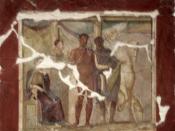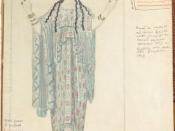There are many themes throughout Hippolytus that could be interpreted as morals. However, as the differences in society and religion between our time and Euripides? time are so great, these morals are relevant in different ways to the Ancient Greeks and to us.
Ancient Greek Audience: This tragedy would have first been performed at the City Dionisia, a very religious, if entertaining, festival, therefore it is unlikely that even Euripides, a playwright known for challenging accepted views, would leave out the main moral that occurs in most Athenian tragedies: that of honouring and respecting the Gods. In fact, this would have been the most likely moral to be picked up by the ancient audiences.
The theme of respect towards the Gods is recurrent in the play, and most importantly, it is the first reason mentioned for the tragic events that follow.
At the start of the play, Aphrodite explains that because of Hippolytus? disrespect towards her, he will be punished: ?This youth...
calls me the most pernicious of the heavenly powers... for his contempt of me, I shall punish Hippolytus this very day.? Even at the very end, the gods, or more specifically Aphrodite, are still being blamed for causing the tragedy: Theseus: ?How often, Aphrodite, shall I in tears remember the wrong that you have done!? The theme of gods punishing men for disrespecting them is also picked up by the other divinity in the tragedy, Artemis: Artemis: ?men of evil ways, their house, their children, all we utterly destroy? At the other end of the command chain, even the servants know better than to insult those better than them, with one tactfully trying to warn Hippolytus of his mistakes before the gods realise: Servant: ?we should observe the honours due to the Gods.? Another moral within this...


